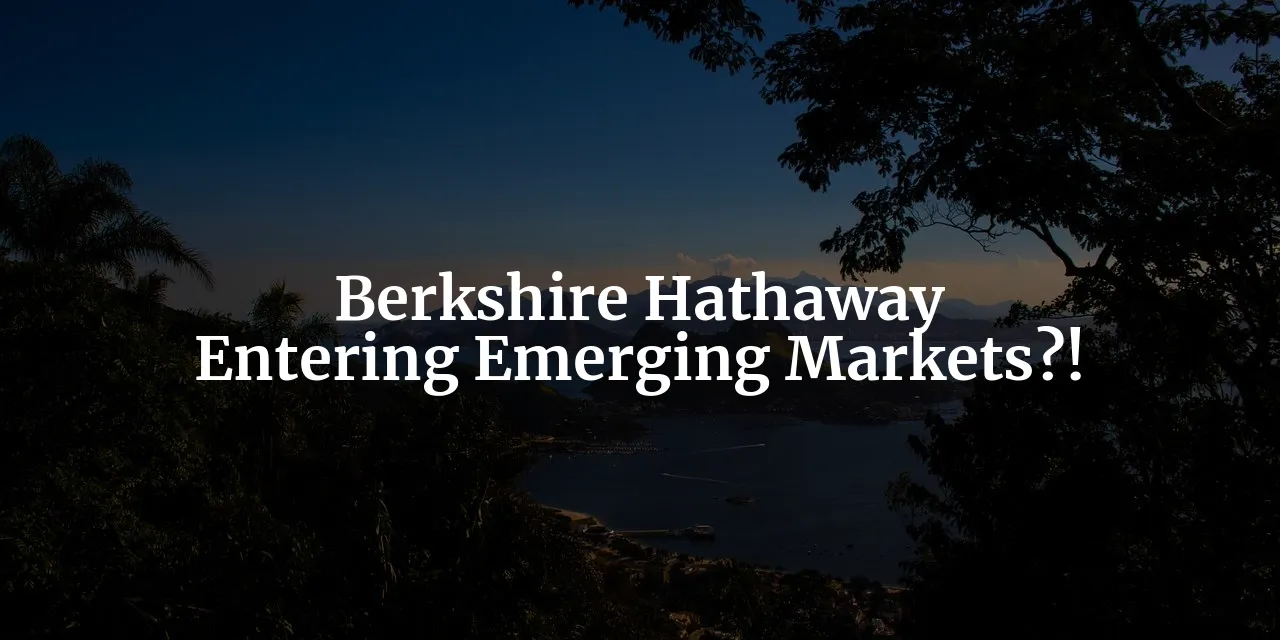Tags: Comments
This fanpage is not officially affiliated with Berkshire Hathaway: Disclaimer
During 2024's shareholder meeting, Warren Buffett and Greg Abel discussed Canada as investment opportunity ↗. What about Emerging Markets? We dive into the conditions for a possible move based on political stability, economic growth potential, reliable capital markets, and more. Uncover why Brazil might stand out as a promising destination for long-term returns.

Introduction
Berkshire Hathaway, under the astute leadership of Warren Buffett, has long been synonymous with value investing and long-term growth. Buffett's investment philosophy, characterized by a meticulous selection of undervalued companies with strong fundamentals, has consistently delivered impressive returns for shareholders. His approach emphasizes patience, thorough analysis, and a preference for holding investments over extended periods to capitalize on compounding growth. This philosophy has not only shaped Berkshire Hathaway's portfolio but also set a benchmark for investors worldwide.
In recent years, the spotlight has increasingly shifted towards emerging markets as a fertile ground for investment opportunities. These markets, characterized by rapid economic growth and expanding middle classes, offer the potential for substantial returns. Notably, emerging market equities have outperformed their developed market counterparts by an impressive 3.3% per annum over the last 25 years1. This outperformance underscores the significant role emerging markets play in the global economy, presenting a compelling case for investors seeking to diversify and enhance their portfolios.
The purpose of this article is to delve into the next potential investment gem for Berkshire Hathaway within the realm of emerging markets. By examining historical, political, and economic insights, we aim to identify a promising country that aligns with Berkshire Hathaway's investment philosophy. Through a comprehensive analysis, we will explore how political stability, economic growth potential, and other critical factors influence investment decisions in emerging markets.
Political Stability
Political stability is a cornerstone of long-term investment success, particularly in emerging markets where volatility can be pronounced. Political stability encompasses four key parameters: political stability, social stability, security, and economic stability1. These factors collectively determine the degree of state stability, influencing the business environment and investment climate. For investors, understanding and assessing political stability is crucial, as it directly impacts the predictability and security of their investments.
Historically, political instability has had profound effects on investments in emerging markets. The 2008-2009 financial crisis serves as a stark reminder of how political and economic turmoil can ripple through markets, causing significant drawdowns. In fact, 20 out of the worst 30 drawdowns in the last 15 years occurred post-financial crisis 1. This period highlighted the shift from diversifiable idiosyncratic risk to non-diversifiable macro-political risk, emphasizing the importance of political stability in investment decisions.
Currently, the political stability of emerging markets varies widely. The Global Political Risk Index (GPRI), developed by Eurasia Group, provides a quantitative measure of political risk, assigning scores to countries on a scale of 1-100, with higher numbers indicating lower levels of risk 1. This index considers four categories: Government, Society, Security, and Economy, offering a comprehensive view of a country's political landscape. For instance, countries with high GPRI scores are perceived as more stable and, therefore, more attractive for long-term investments.
Eurasia Group's systematic methodology for measuring political risk involves forward-looking assessments of how politics will affect a country's business environment over the next six months to two years 1. This approach, which includes surveys across five political dimensions—government stability/cohesion, social stability, security, economic policy, and investment policy—enables a nuanced understanding of political trajectories and their implications for investment.
There is a nice overview of GPRI scores in the article from 2015 1. Some European and Asian Emerging Market countries range on the top like the Czech Republic, Hungary, Poland, South Korea and Malaysia close to a GPRI score of 80. China, India and Brazil range in the 60's score, while Russia scored at around 50, which is probably not valid anymore.
An example we detail later is Brazil, a country with a complex political landscape and significant investment potential. Brazil's financial market is strictly regulated by several government institutions 7. However, despite these robust regulatory frameworks, Brazil's political stability has fluctuated, impacting investor confidence and market performance.
For Berkshire Hathaway, weighing political stability in investment decisions is paramount. Historical references, such as the impact of the 2008-2009 crisis, underscore the need for a thorough assessment of political risk. Let's turn to the next dimension of our analysis.
Economic Growth Potential
Economic growth potential is a key factor for investment because it directly influences the profitability and sustainability of businesses operating within a market. For shareholders of Berkshire Hathaway, identifying markets with robust growth trajectories can lead to substantial returns. Emerging markets, particularly those in the G20, have shown significant integration with global markets over the past two decades, doubling their share of world trade and now accounting for one-third of global GDP 3. This growing influence underscores the importance of targeting economies with strong growth projections. Historically, emerging markets have experienced remarkable growth periods. Over the past two decades, growth spillovers from domestic shocks in G20 emerging markets have increased and now explain as much variation in output as those from advanced economies 3. For instance, a decline in productivity in these markets can lower global output three times more than it did in 2000 3.
Current economic projections for emerging markets are promising. China's GDP, for example, is projected to grow from $19.37 trillion in 2023 to $27.5 trillion by 2028 4. Similarly, India's GDP is expected to rise from $3.76 trillion in 2023 to $5.57 trillion by 2028 4. Other notable projections include Brazil's GDP increasing from $2.08 trillion to $2.75 trillion and Indonesia's GDP growing from $1.39 trillion to $2 trillion over the same period 4. These projections indicate substantial economic expansion, presenting lucrative opportunities for investors:
| Country | GDP 2023 (Trillion USD) | GDP 2028 (Trillion USD), estimation |
|---|---|---|
| China | 19.37 | 27.5 |
| India | 3.76 | 5.57 |
| Brazil | 2.08 | 2.75 🚀 |
| Indonesia | 1.39 | 2.0 |
| Mexico | 1.67 | 2.0 |
| Saudi Arabia | 1.06 | 1.25 |
| Türkiye | 1.33 | 1.33 |
| Taiwan | 0.79 | 1.0 |
| Poland | 0.75 | 1.0 |
Certain sectors within these emerging markets exhibit particularly high growth potential. The technology sector, driven by advancements in Artificial Intelligence, has outperformed in 2024 6. Additionally, sectors such as electrical equipment, machinery, and metal products are expected to benefit from positive growth surprises in G20 emerging markets 3. This sectoral growth can provide targeted investment opportunities for Berkshire Hathaway, aligning with its strategy of investing in high-potential industries.
Brazil serves as a compelling case for economic growth potential. With its GDP projected to grow from $2.08 trillion in 2023 to $2.75 trillion by 2028 4 (32% total, 5.7% annual), Brazil's economy is poised for significant expansion. Key sectors driving this growth include technology, energy, and consumer goods. The Brazilian financial market further ensures a stable environment for investment 7. This combination of robust economic projections and sectoral growth might render Brazilian companies attractive targets for Berkshire Hathaway's investment portfolio.
Reliable Capital Markets
Reliable capital markets are essential for investment as they provide a stable and transparent environment for buying and selling securities. These markets are crucial for ensuring liquidity, price discovery, and risk management. For Berkshire Hathaway, investing in countries with reliable capital markets minimizes risks and enhances the potential for stable returns ↗. The stability and structure of financial markets, regulated by strong entities plays a pivotal role in this regard 7. Historically, reliable capital markets have significantly influenced investment decisions in emerging markets. For instance, the regulatory frameworks and market performance in countries like South Korea and Taiwan have attracted substantial foreign investment, contributing to their economic growth. These examples illustrate how robust capital markets can create a conducive environment for investment, driving economic development and investor confidence.
Current capital market structures in various emerging markets are characterized by comprehensive regulatory frameworks and strong market performance. Berkshire Hathaway's investment decisions are significantly influenced by the reliability of capital markets and the company's understanding of that reliability. Historically, besides the United States, the company has favored investments in countries with stable and transparent market environments such as Japan ↗. Berkshire's investments in the United States and other developed markets have been driven by the reliability of their capital markets.
Let us provide an exemplary overview of the regulatory bodies in some important Emerging Market countries and a very subjective indication of their market performance:
| Country | Regulatory Bodies | Market Performance |
|---|---|---|
| Brazil | CMN, Central Bank, CVM, B3 | Stable |
| South Korea | Financial Services Commission | Strong |
| Taiwan | Financial Supervisory Commission | Robust |
| India | SEBI, RBI | Growing |
| Mexico | CNVB, Banxico | Stable |
| Indonesia | OJK, Bank Indonesia | Developing |
| Saudi Arabia | CMA, SAMA | Expanding |
| Poland | KNF, NBP | Strong |
Note that we have deliberately left out indications on market valuation: The table is for information purposes only and you should always make your own research before making any investment decissions, see also disclaimer at the bottom of the page.
Rule of Law and Property Rights
The rule of law and property rights are foundational elements for any robust investment strategy. The rule of law ensures that all individuals and entities are accountable to laws that are publicly promulgated, equally enforced, and independently adjudicated. Property rights refer to the legal ownership of resources and the ability to use them as one sees fit. For investors, these concepts are crucial as they provide legal certainty and protection of investments, ensuring that assets are secure and that contracts will be honored.
Historically, the presence or absence of the rule of law and property rights has significantly influenced investment outcomes in emerging markets. For instance, in China, the gradual strengthening of property rights and legal frameworks since the late 20th century has attracted massive foreign investments, contributing to its economic boom. Conversely, Russia in the 1990s experienced substantial capital flight due to weak legal protections and rampant corruption, not to mention the current situation... Similarly, Argentina has seen fluctuating investment levels, heavily influenced by its inconsistent enforcement of property rights and frequent legal uncertainties.
Today, many emerging markets are making strides in improving their legal frameworks. Countries like India and Mexico have implemented reforms to enhance the protection of property rights and the enforcement of contracts. These improvements are vital for attracting and retaining foreign investment, as they reduce the risk of expropriation and legal disputes.
For a conglomerate like Berkshire Hathaway, countries with strong rule of law and property rights are likely to be prioritized in investment decisions. Berkshire Hathaway would naturally favor markets with stable legal environments, as evidenced by its significant investments in the United States and other developed economies. By focusing on emerging markets with robust legal frameworks, Berkshire might mitigate risks and ensure the security of its investments.
Currency Stability
Currency stability refers to the consistency and predictability of a country's currency value. It is a critical factor for investors because currency volatility can significantly impact returns. For example, a sudden devaluation can erode the value of foreign investments, while a stable currency environment can enhance predictability and reduce risk.
The impact of currency instability on investments is well-documented. For instance, during the Asian Financial Crisis of 1997, several Southeast Asian currencies plummeted, leading to massive losses for foreign investors. In contrast, countries like Chile have maintained relatively stable currencies through prudent fiscal and monetary policies, attracting steady investment flows.
Currently, many emerging markets are better equipped to handle currency volatility. Improved policy frameworks, increased currency reserves, and refined exchange-rate arrangements have contributed to greater stability. For example, major emerging markets like India and Indonesia have shown resilience against global interest rate volatility, thanks to enhanced central bank independence and proactive monetary policies 5.
Brazil serves as a prime example of how effective monetary policies and substantial currency reserves can contribute to currency stability. Brazil's central bank has been proactive in managing inflation and maintaining a (relatively) stable exchange rate, which has bolstered investor confidence. Despite global interest rate volatility, Brazil's currency has remained relatively stable, supported by its significant currency reserves and prudent economic management 5.
When assessing potential investments, Berkshire Hathaway is likely to consider currency stability as a critical factor. Historical references indicate that Berkshire prefers markets where currency risks are minimized, ensuring more predictable returns. By focusing on countries with stable currencies, Berkshire can safeguard its investments against the adverse effects of currency fluctuations.
Currency reserves are hugely different based on the country of investigation. Here are some numbers based on a quick google search:
| Country | Currency Stability | Currency Reserves |
|---|---|---|
| Brazil | High | $320b |
| India | Moderate | $610b |
| Indonesia | High | $140b |
| Argentina | Low | $20b |
Not surprisingly, the situation in Brazil is significantly better than for its neighbor Argentina. The rule of law, property rights, and currency stability are pivotal factors that Berkshire Hathaway will likely consider when identifying its next investment gem in emerging markets. By focusing on countries with strong legal frameworks and stable currencies, Berkshire can ensure the security and profitability of its investments, aligning with its historically prudent investment strategies.
Competent Financial Institutions
Competent financial institutions are the backbone of any thriving economy. They encompass central banks, regulatory bodies, and organized securities markets that ensure currency stability, financial system soundness, and market integrity. These institutions play a pivotal role in investment decisions by providing a stable and predictable environment for investors. The Central Bank ensures currency stability and oversees the financial system's soundness, while regulatory bodies like the CVM (Securities and Exchange Commission of Brazil) regulate securities markets and possess investigative powers to uphold market integrity 7.
Historically, the presence of competent financial institutions has significantly influenced investment decisions in emerging markets. For instance, during the early 2000s, South Korea's financial reforms, including the establishment of the Financial Supervisory Service (FSS), attracted substantial foreign direct investment (FDI). Similarly, India's Reserve Bank of India (RBI) has been instrumental in maintaining economic stability, thereby attracting global investors.
In the current landscape, various emerging markets boast robust financial institutions. For example, Brazil's financial market is regulated by the CMN (National Monetary Council), the Central Bank, and the CVM. The CMN sets inflation targets and guides monetary policies, while the Central Bank ensures currency stability and financial system soundness. The CVM regulates securities markets and has investigative powers to maintain market integrity 7. Additionally, B3, Brazil's main stock exchange, manages organized securities markets and acts as a central counterparty, providing central deposit services for market participants 7. These institutions collectively create a conducive environment for investment.
Berkshire Hathaway, known for its meticulous investment strategies, might prioritize countries with competent financial institutions. Berkshire Hathaway values stability and predictability, which competent financial institutions provide. For instance, Berkshire's investments in American Express ↗ highlight its preference for financial institutions with robust regulatory frameworks and sound operational practices.
Favorable Tax Environment
A favorable tax environment is characterized by tax policies that minimize the tax burden on investors, thereby enhancing their returns. This includes lower tax rates, tax incentives, and clear tax regulations. A favorable tax environment is crucial for investment as it directly impacts the net returns on investments and can significantly influence investment decisions 2.
Historically, tax environments have played a significant role in shaping investment decisions in emerging markets. For instance, Ireland's low corporate tax rate has attracted numerous multinational corporations, transforming it into a tech hub. Similarly, Singapore's favorable tax policies have made it a preferred destination for global investors.
In the current global landscape, various emerging markets offer favorable tax environments. For example, Brazil provides several tax incentives for foreign investors, including exemptions and reductions in taxes on profits and dividends. These policies are designed to attract foreign direct investment (FDI) and stimulate economic growth 2. Additionally, Brazil has bilateral tax treaties with several countries, which further enhance its attractiveness as an investment destination 2.
Berkshire Hathaway, with its focus on maximizing returns, would likely assess the tax environment in its investment decisions. Historical references show that Berkshire values tax efficiency. For instance, its investments in Burlington Northern Santa Fe ↗ and Kraft Heinz ↗ were influenced by favorable tax considerations.
Thus, competent financial institutions and a favorable tax environment are critical factors that Berkshire Hathaway considers when making investment decisions ↗. Brazil, with its robust financial institutions and attractive tax policies, might stand out as a promising investment destination. But why this particular country?

Why Brazil?
As discussed, when evaluating emerging markets for investment, several critical factors come into play, including political stability, economic growth potential, reliable capital markets, rule of law and property rights, currency stability, competent financial institutions, and a favorable tax environment. Brazil stands out as a compelling candidate due to its unique combination of these attributes, making it an attractive destination for investors seeking robust returns. Let us connect the dots and re-iterate on the key elements.
Brazil's political stability has been a cornerstone of its appeal. Despite occasional turbulence, the country's democratic institutions have proven resilient. The Global Political Risk Index (GPRI) assigns quantitative scores to countries, and Brazil's scores reflect a relatively stable political environment compared to other emerging markets 1. This stability is crucial for long-term investments, as it reduces the risk of sudden policy shifts that could adversely affect business operations.
In terms of economic growth potential, Brazil's GDP is projected to grow from $2.08 trillion in 2023 to $2.75 trillion by 2028, indicating a robust growth trajectory 4. This growth is driven by diverse sectors, including agriculture, mining, and manufacturing, which provide a broad base for economic expansion. Furthermore, Brazilian consumer spending is expected to drive economic growth, with personal loans growing by more than 11% 9.
Brazil's capital markets are well-regulated and reliable. The Central Bank of Brazil, along with the CVM (Brazilian Securities and Exchange Commission), ensures market stability and investor protection 7. The CMN sets inflation targets and guides monetary policies, while the CVM regulates securities markets and has investigative powers. The presence of B3, the Brazilian stock exchange, which manages organized securities markets and acts as a central counterparty, further enhances market reliability.
The rule of law and property rights in Brazil are well-established, providing a secure environment for investments. The country's legal framework supports business operations and ensures that property rights are protected, which is a critical factor for foreign investors.
Currency stability is another significant advantage. Although emerging markets often face currency volatility, Brazil has implemented policies to stabilize its currency. The Central Bank's efforts to ensure currency stability and financial system soundness have been effective, making Brazil a safer bet compared to other emerging markets 7.
Brazil's financial institutions are competent and well-regulated ↗. The country's banking sector is robust, with major banks like Itau Unibanco and Banco Santander Brasil regularly paying dividends, reflecting their financial health and stability 10. These institutions play a crucial role in facilitating investment and economic growth.
The tax environment in Brazil is also favorable for investors. The government has implemented various tax incentives to attract foreign investment, making it easier for companies to operate and thrive in the Brazilian market.
Moreover, Brazil's economic and political development has been marked by significant reforms and growth. Over the past few decades, Brazil has transitioned from a period of hyperinflation and economic instability to a more stable and growing economy. Market reforms in the 1990s, such as the Real Plan, helped stabilize the currency and control inflation, setting the stage for sustained economic growth. The country's democratic institutions have also matured, providing a stable political environment that supports economic development.
Brazil currently offers a plethora of investment opportunities across various sectors. Key sectors include mining, beverages, oil and gas, food processing, energy, utilities, steel, and water management. Companies like Vale S.A., Ambev S.A., Petrobras, BRF S.A., Ultrapar Participações S.A., CEMIG, Cosan S.A., Gerdau S.A., and SABESP are at the forefront of these sectors, offering significant growth potential 10. These companies are not only leaders in their respective industries but also focus on sustainability and innovation, making them attractive investment targets.
According to worldperatio.com, the Brazilian stock market is currently valued at a price-to-earnings (PE) ratio of around 7.3 11. Countries like Malaysia (8.3), Turkey (7.8), Austria (7.0) and Greece (6.8) are direct neigbours. In turn, very few countries offer such low PE ratios as Brazil at this point. The country's Buffett Indicator shows a ratio of market capitalization to GDP of around 50% 8 - the United States is currently at around 190%.
Here are Brazil's largest companies by market capitalization 12:
| Rank | Company | Market Cap (US$) |
|---|---|---|
| 1 | PETROBRAS | $91.21 billion |
| 2 | ITAÚ UNIBANCO HOLDING S.A. | $53.66 billion |
| 3 | VALE S.A. | $48.22 billion |
| 4 | AMBEV S.A. | $33.95 billion |
| 5 | BANCO BTG PACTUAL S.A. | $31.86 billion |
| 6 | WEG S.A. | $29.61 billion |
| 7 | BANCO DO BRASIL S.A. | $28.93 billion |
| 8 | BANCO BRADESCO S.A. | $24.19 billion |
| 9 | BANCO SANTANDER (BRASIL) S.A. | $18.91 billion |
| 10 | ITAÚSA S.A. | $18.7 billion |
Despite its many advantages, investing in Brazil is not without challenges. Recent market performance has been volatile, with Brazilian stocks down about 9% year to date 9. The iShares MSCI Brazil ETF (EWZ) has also seen a decline, reflecting broader market trends. Additionally, the global economic environment, including interest rate volatility and potential shifts in U.S. monetary policy, could impact Brazil's market performance. However, the long-term growth prospects and attractive valuations of Brazilian stocks provide a compelling case for investment.
Therefore, Brazil's unique combination of political stability, economic growth potential, reliable capital markets, rule of law, currency stability, competent financial institutions, and favorable tax environment makes it a promising destination for investment. Given Berkshire Hathaway's history of successful investments, Brazil represents an opportunity to capitalize on a growing economy with significant potential for long-term returns. By leveraging Brazil's strengths and navigating its challenges, Berkshire Hathaway can uncover its next investment gem in this vibrant emerging market.

Conclusion
The analysis of emerging markets for potential investment opportunities has highlighted Brazil as a standout candidate for Berkshire Hathaway. With a strong foundation in political stability, economic growth potential, reliable capital markets, rule of law, currency stability, competent financial institutions, and a favorable tax environment, Brazil presents a compelling case for long-term investment. The country's historical context, current investment opportunities, and potential challenges have been thoroughly examined to provide a comprehensive understanding of the Brazilian market.
Brazil's unique position in the global economy, coupled with its diverse sectors and robust regulatory frameworks, sets it apart as an attractive destination for investors seeking stable returns. Despite recent market volatility and external economic factors, Brazil's long-term growth prospects and attractive valuations make it a promising investment opportunity. By leveraging its strengths and navigating potential challenges, Berkshire Hathaway can uncover its next investment gem in Brazil's vibrant emerging market.
As Berkshire Hathaway continues its tradition of strategic and prudent investments, Brazil's political stability, economic growth potential, reliable capital markets, rule of law, currency stability, competent financial institutions, and favorable tax environment align with the company's investment philosophy.
References
-
Political Risk and Emerging Market Investing - thehedgefundjournal.com ↩↩↩↩↩↩↩
-
Political stability and foreign direct investment inflows in 25 Asia-Pacific countries: the moderating role of trade openness - Humanities and Social Sciences Communications - www.nature.com ↩↩↩
-
Emerging Markets Are Exercising Greater Global Sway - www.imf.org ↩↩↩↩
-
The Top Emerging Markets in the World - www.nasdaq.com ↩↩↩↩↩
-
Emerging Markets Navigate Global Interest Rate Volatility - www.imf.org ↩↩
-
Schroders Emerging Market Lens Q2 2024: your guide to EM valuations - www.schroders.com ↩
-
01 - Brazilian Financial Market Structure - www.b3.com.br ↩↩↩↩↩↩↩↩
-
Buffett Indicator: Brazil Stock Market Valuations and Forecasts - www.gurufocus.com ↩
-
There's a bull case emerging in Brazilian stocks for long-term investors - www.cnbc.com ↩↩
-
Brazil stocks to invest in 2024 - skilling.com ↩↩
-
Brazil Stock Market: current P/E Ratio - worldperatio.com ↩
-
Brazil’s Largest Companies by market capitalization, 2024 - CEOWORLD magazine - ceoworld.biz ↩












